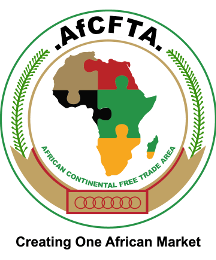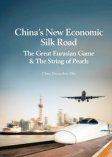A Digital Free Trade Agreement for Africa’s Silk Road
By Michael Mudd
 The African Continental Free Trade Area (AfCFTA) was signed into being on March 21, 2018 in Kigali, Rwanda, where 44 African heads of state and governments met and agreed to the binding commitment. The AfCFTA will come into effect after ratification by at least 22 countries.
The African Continental Free Trade Area (AfCFTA) was signed into being on March 21, 2018 in Kigali, Rwanda, where 44 African heads of state and governments met and agreed to the binding commitment. The AfCFTA will come into effect after ratification by at least 22 countries.
This will be one of the world’s largest free-trade areas comprising 55 countries with 1.2 billion people generating over US$4 trillion in combined consumer and business spending. The AfCFTA will therefore open up a significant number of countries to create a single continental market for goods and services, as well as a customs union with free movement of capital and business travelers across their borders. According to the United Nations Economic Commission on Africa, intra-African trade is likely to increase by 52.3 percent under the AfCFTA and will double upon the further removal of non-tariff barriers.
This will enhance opportunities to major exporters to Africa, in particular China, under the One Belt One Road initiative. Physical infrastructure has included ports in both West and East Africa, including Ghana and Cameroon and Djibouti and Tanzania, and railways in Ethiopia/Djibouti and Kenya.
Investments in digital connectivity have been pioneered by companies such as Huawei and ZTE, starting in the early 2000’s; by 2010 they were active in 50 African countries, providing communications services for over 300 million users. Competitive pricing and innovative financing, including commodity offsets have enabled companies to gain contracts in otherwise cash strapped countries.
Technology and connectivity will play a key role in driving intra-African trade. In Europe, just over 70 percent of trade is between EU countries, many share a common market also for digital trade. The figure is less in more fractured regions without a strong trading agreement; 51 percent in Asia and only 19 percent in Latin America. In Africa, the figure is lowest of all with intra-regional trade accounting for only 15 percent of the total. In manufacturing for example, local input requirements (value added) depress economic activity as there are only a few countries that can scale. Digital trade on the other hand, using hyperscale computing can scale almost infinitely.
The potential for growth has been well documented and can add between 2 and 4 percent to GDP of countries that embrace digital trade. Digital information flows — which were practically nonexistent just 15 years ago — now exert a larger impact on GDP growth than the centuries-old trade in goods, according to a new McKinsey Global Institute (MGI) report, Digital globalization: The new era of global flows.
To fully achieve the vision outlined in the AfCFTA, an African wide recognition of the importance of the free flow of information for digital trade within the AfCFTA will also be critical for businesses to fully realize the AfCFTA by accelerating continental integration. In addition to transmitting valuable streams of information and ideas in their own right, data flows enable the movement of goods, services, finance, and people. Virtually every type of cross-border transaction now has a digital component.
First and foremost are the challenges of accessibility and affordability. According to the ITU, in 2017, half the world’s population already had access to the internet; however, internet user penetration in Africa was only 21.8 percent. Some private sector sources using different statistical criteria, put the figure higher, but still well below the world average. This is where low cost hardware and novel technologies, such as the use of TV White Space frequencies, have shown promise in a number of trials in Africa.
There are considerable variances, in particular for landlocked countries where costs are higher due the ‘last thousand miles’. In general, there is a correlation between the wealth of a country, usually expressed as GDP and internet usage, which is similar for example, in Asia Pacific economies.
Visionary computing proponents claimed some years ago that cloud computing will “transform the way IT is consumed and managed, promising improved cost efficiencies, accelerated innovation, faster time-to-market, and the ability to scale applications on demand”.
Cloud computing is mature and delivers on the promise of enhancing economic, political, and cultural interdependence among African nations by dramatically accelerating cross border information flows and services exchange. Just as important as trade in agricultural products and industrial/manufactured goods, trade in information or “bits” can assist in enhancing overall economic growth and potentially growing regional integration within Africa.
The successful development of cloud computing throughout Africa also depends on the development of a regional market for both services and innovation which will result in greater job creation, in particular of the youth, and therefore growth in GDP.
An AfCFTA that recognises trade in digital services will be a more inclusive trade block for the 21st century, potentially equal to that of the EU/EFTA for Europe or ASEAN/APEC for Asia.
This is the digital chapter of the AfCFTA that has yet to be written.
About the author.
Mr Michael Mudd is the founder and Managing Partner of Asia Policy Partners LLC, an independent consultancy providing thought leadership on technology policy for digital transformation, security, privacy, compliance, standards and trade related business. An appointed expert to JTC-1 of the ISO, he is also a member of the Government of Hong Kong’s Expert Group on Cloud Computing, specifically the working group on Cloud security and privacy where he advises on policy. He is a member of the Policy committee of the Hong Kong Computer Society and the chief representative of the Open Computing Alliance in the APAC and MEA regions. He is an associate member of the Middle East & Africa Cloud Alliance. He also has created and delivered executive training on technology risk, privacy and digital security for non-technical office staff to mitigate losses from fraud as well as CxO level guidance on the EU GDPR. He may be contacted at asiaitpolicy@live.com
 Related Reading:
Related Reading:
![]() China’s Silk Road Gold Fund – The African and South American Gold Deposits (Part 3 of a 5 Part Series)
China’s Silk Road Gold Fund – The African and South American Gold Deposits (Part 3 of a 5 Part Series)
![]() China-Africa Relations: At a Crossroads?
China-Africa Relations: At a Crossroads?
China’s New Economic Silk Road
This unique and currently only available study into the proposed Silk Road Economic Belt examines the institutional, financial and infrastructure projects that are currently underway and in the planning stage across the entire region. Covering over 60 countries, this book explores the regional reforms, potential problems, opportunities and longer term impact that the Silk Road will have upon Asia, Africa, the Middle East, Europe and the United States.






